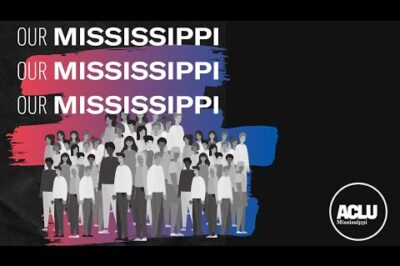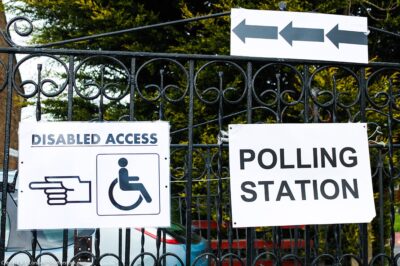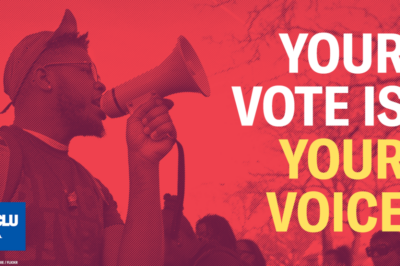Georgia's Voter Registration Procedures Discriminate And Should Be Permanently Blocked, Civil Rights Coalition Argues
FOR IMMEDIATE RELEASE
CONTACTS: Maria Archuleta, (212) 519-7808 or 549-2666; media@aclu.org
Stacie B. Royster, Lawyers’ Committee, (202) 662-8317; sroyster@lawyerscommittee.org
Nina Perales, MALDEF, (210) 224-5476
ATLANTA – A coalition of civil rights groups argued before a federal court in Atlanta today that Georgia’s citizenship voter-verification procedures discriminate against minorities and should be permanently blocked absent federal preclearance under Section 5 of the Voting Rights Act. Under the procedures, U.S. citizens from minority communities were incorrectly flagged as non-citizens and prevented from registering to vote.
Section 5 of the Voting Rights Act requires jurisdictions with a history of discrimination in voting to obtain federal approval before implementing any changes in their practices or procedures affecting voting.
The civil rights coalition includes the American Civil Liberties Union, the Lawyers’ Committee for Civil Rights Under Law (Lawyers’ Committee), the Mexican American Legal Defense and Education Fund (MALDEF), Georgia attorney Brian Spears and the law firm of Debevoise & Plimpton LLP. The coalition represents Cherokee County resident Jose Morales, the Georgia State Conference of the NAACP, the Georgia Association of Latino Elected Officials and the Center for Pan Asian Community Services.
“There is no doubt that racial and language minorities in Georgia would be subject to discrimination in voting if these voter-verification procedures were allowed to be implemented again,” said Laughlin McDonald, Director of the ACLU Voting Rights Project. “We have already seen that during the short time they were in effect, U.S. citizens were unlawfully prevented from registering.”
The contested voter-registration procedures flag certain voter-registration applicants and some types of already-registered voters as non-citizens based on records from the Georgia Department of Driver Services (DDS). The records, however, contain out-of-date citizenship information because DDS fails to update them to reflect the thousands of Georgia residents who become U.S. citizens each year. The state’s own data has shown that the procedures have incorrectly flagged thousands of Georgia citizens who submitted voter-registration applications as non-citizens.
“These flawed procedures would burden or deny the right to vote to many thousands of eligible Georgia voters,” said Robert A. Kengle, an attorney with the Voting Rights Project of the Lawyers’ Committee, who argued the case today. “These procedures should be permanently blocked.”
The coalition filed a lawsuit challenging the voting procedures in October 2008 after a number of U.S. citizens had been incorrectly flagged as non-citizens. Those who were flagged were denied the right to vote unless they presented written evidence of citizenship.
A federal court in Atlanta issued a preliminary block on the procedures on October 27, 2008, because the Georgia Secretary of State implemented the measures without obtaining Section 5 preclearance.
In May 2009, after Georgia finally submitted the procedures for Section 5 review, the U.S. Department of Justice (DOJ) found that the state failed to prove that they did not have a discriminatory effect on minority voters and refused to preclear them.
“Georgia’s discriminatory voter-identification measures primarily affect racial minorities,” said Nina Perales, an attorney with MALDEF. “The state’s attempt to disenfranchise minority U.S. citizens didn’t make it past the Department of Justice and it won’t hold up in court either.”
Despite DOJ’s findings, Georgia Secretary of State Brian Kemp has announced that he intends to file a lawsuit in Washington, D.C. seeking court preclearance of the flawed voter-registration practices.
“The question before the court here in Georgia today is simply whether these procedures should be permanently enjoined,” said Kengle. “But Georgia has failed repeatedly to prove to the Department of Justice that these procedures were non-discriminatory, and we are confident that the federal court in the District of Columbia would find them discriminatory as well.”
Attorneys on the case, Morales et al. v. Kemp et al., include McDonald and Meredith Bell-Platts of the ACLU Voting Rights Project, Kengle, Jon Greenbaum and Mark A. Posner of the Lawyers’ Committee, Perales of MALDEF, Brian Spears of the Law Office of Brian Spears and Jason S. Pielemeier and Young K. Lee of Debevoise & Plimpton.
The coalition’s supplemental brief for the U.S. District Court for the Northern District of Georgia Atlanta Division can be found online at: www.aclu.org/voting-rights/morales-v-kemp-supplemental-brief
The coalition’s complaint can be found online at: www.aclu.org/votingrights/access/39714lgl20090310.html
Civil Rights Division Acting Assistant Attorney General Loretta King’s letter blocking the procedures can be found online at: www.aclu.org/votingrights/access/39715res20090529.html
Stay Informed
Every month, you'll receive regular roundups of the most important civil rights and civil liberties developments. Remember: a well-informed citizenry is the best defense against tyranny.




